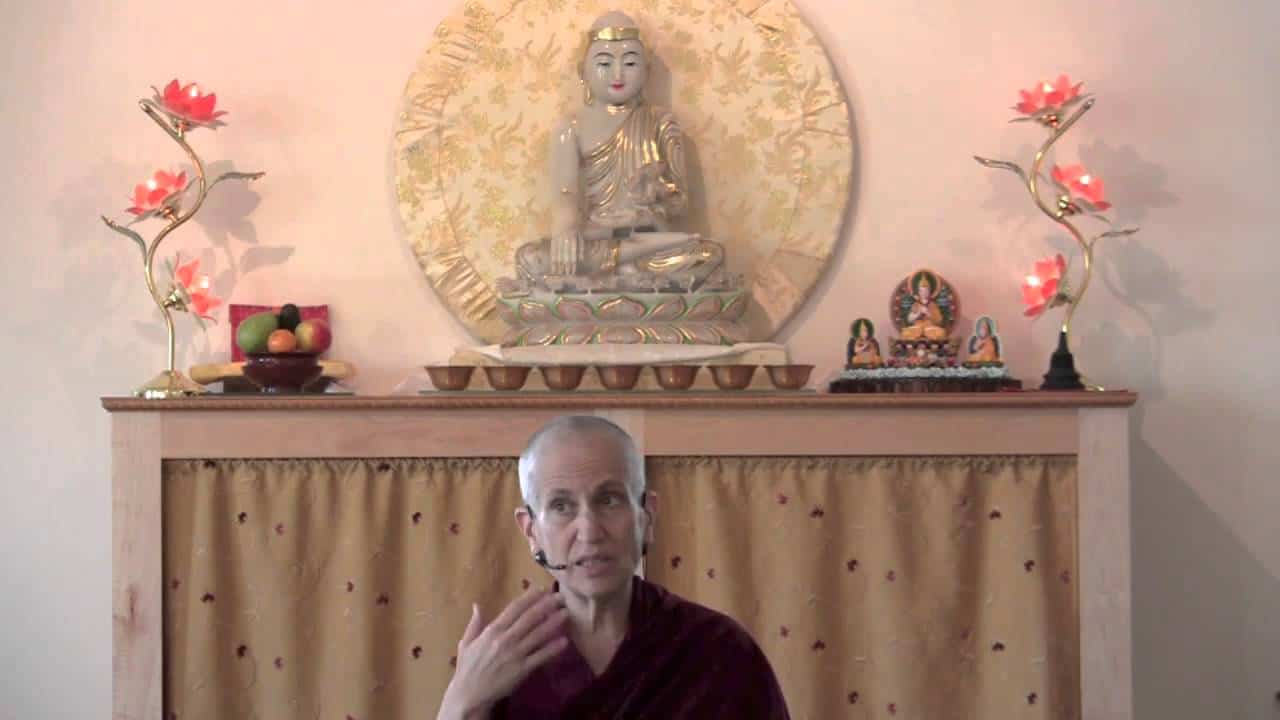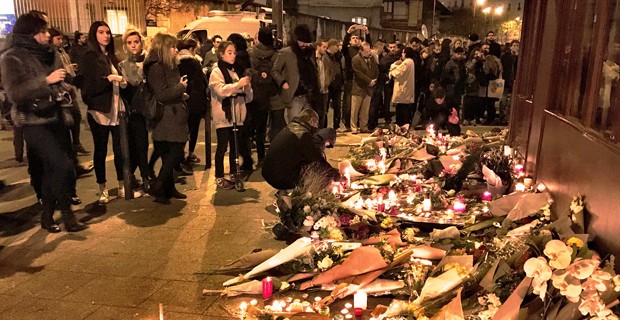Becoming a better person
Part of a series of teachings on the text The Essence of a Human Life: Words of Advice for Lay Practitioners by Je Rinpoche (Lama Tsongkhapa).
- Making prayers and offerings
- Creating virtuous karma
- Using body and speech in beneficial ways
- Taking and renewing precepts
- Dedicating merit
The Essence of a Human Life: Becoming a better person (download)
We’ll continue on with the verse that we started yesterday. It says,
To the Three Jewels make prayers and offerings each day,
work hard to be wholesome, confess previous wrongs,
strengthen your precepts again and again,
dedicating all merit for awakening.
We did the first line yesterday about “To the Three Jewels make prayers and offerings each day” and talked about how to set up a general daily practice with your motivation in the morning, your dedication of merit in the evening.
The second line: “Work hard to be wholesome.” Work hard to create virtuous karma. We talked about that earlier, we talked quite a bit about karma earlier in this series. He’s reminding us to put our energies into using our body and speech and mind in a virtuous way that doesn’t cause harm to ourselves or others.
That’s kind of the basic thing of the path. And it’s the basic thing of being a good human being. If our body, speech, and mind are all over the place, then it’s going to be hard to actualize the highest stages of highest class tantra. That’s not going to work. Really to put our energy, watching, especially our speech. Our speech sometimes can be really bad. To take care of it, abandon the four destructive actions of speech: lying, creating disharmony, harsh words, and idle talk. And using our speech to speak truthfully, to create harmony amongst people who are divided, or to keep people who are together together, to speak kindly, to point out people’s good qualities to them so that they’re encouraged. To speak at appropriate times about appropriate topics. Really to make that something fundamental in our lives.
Then it says “confess previous wrongs.” All the mistakes we’ve made in our life. We’ve all made tons of mistakes, haven’t we? Instead of just lugging them along with us and feeling guilty and feeling unworthy and having low self-esteem and all that kind of stuff, then do purification practices. Be responsible for what we did, purify the karma through revealing, confessing it, and making amends at least in our mind, and having a determination not to do it again, and then doing some kind of remedial action. In that way put the past to rest. Instead of letting the past always weigh on us, especially in terms of our own destructive actions, to clear it up. Don’t wait until we die to do that but do it every day. If there’s something in the course of a day that we regret doing, in the evening, or as soon as we regret it, just feel that regret and do the four opponent powers, and then go on, instead of letting things weigh on us and accumulate so much.
Then “strengthen your precepts again and again.” Sometimes there’s discussion about whether laypeople can retake their five precepts. Lama Yeshe always let people do it, but I’ve heard other teachers say no. His Holiness quoted (?), who was one of his very precious teachers, saying that Gen Nima had quoted a verse from the Vinaya saying that it’s fine for lay people to retake their five precepts if they’ve degenerated them. That’s a very good thing to do to strengthen your precepts. And then as I mentioned the other day, when you feel like you’re getting kind of lazy and your mind’s all over the place then take the one-day precepts, especially the eight Mahayana precepts. That really gets you back on track.
In terms of monastics, as long as we have our ordination we aren’t allowed to retake it. Once you’ve taken your monastic ordination you have that, unless you’ve given it back or completely transgressed it.
And then “dedicating all merit for awakening.” All the merit we create during the day, then in the evening dedicate it. And you don’t have to wait until the evening. That’s why at the end of all the teachings, at the end of all the meditation sessions, we always do dedication verses.
It’s nice to do longer dedications in the evening. Lama Zopa, his dedications go on for about an hour, so I’m not saying that you have to do that, but we usually do a few more verses in the evening in terms of rejoicing at what we did during the whole day and then dedicating that.
The real benefit of dedicating the merit is that it protects it from being destroyed by anger or wrong views, and it really sets our merit going in the direction that we want, so it’ll ripen as we want. So it’s important to dedicate for the highest, long-term goal, full awakening. If you dedicate for that, the merit doesn’t get used up until that’s attained, and in the process you get a good rebirth and good conditions and things like that. If you only dedicate for a good rebirth and good conditions, the merit ripens in that and finishes. So very important to have the long-term goal in mind.
When we live like this, with our good motivation in the morning, being mindful of our precepts and having introspective awareness during the day, in the evening doing some purification and dedicating the merit, then you can see, if you practice like this, then day by day you’re going to improve. Day by day we’ll improve. Whatever mistakes we made we’ll acknowledge them. We’ll have a determination not to do them again. We will learn from them. Then the next day we’ll try again and do better. Sometimes we might slip back. But the thing is, if we practice like this continually, trying to practice what’s wholesome, purify what isn’t, and dedicate the merit, then you’ve got to progress. And as we progress, that progression becomes evident to the people we’re around because we’re just nicer people to be around. And in our own mind we find that we’re much happier people than we were before. We can see the progress happen in terms of our own experience as well.
His Holiness always says, “Don’t look for your progress day by day, but look over a period of one year, or two years, a longer period of time.” Think about what you were like a year ago, or two years ago, or five years ago, and he said then you can really see the change. I think some of you’ve been practicing longer than that and you can see the change in yourselves, and the people who live with you can see the change in you too, which is very good feedback when that happens.
[In response to audience] That’s where you also see the progress in yourself is, like you said, when you start out where some point understanding is quite intellectual, and then you gain some experience, you contemplate it more and more, and then it’s not so intellectual anymore, it’s something that you really live, and you have a lot of confidence in that. You can see the change in your mind that way too. When we start out practicing we may say, “Is it really possible to get rid of the self-centered thought? I don’t think that’s possible….” But then as you practice and you start to apply the antidotes, you can see that you’re making progress, and then that gives you confidence based on your own experience. Your self-centered thought may not be completely gone, but it’s certainly less than it was before. So that’s progress, and we should really rejoice about that.
Venerable Thubten Chodron
Venerable Chodron emphasizes the practical application of Buddha’s teachings in our daily lives and is especially skilled at explaining them in ways easily understood and practiced by Westerners. She is well known for her warm, humorous, and lucid teachings. She was ordained as a Buddhist nun in 1977 by Kyabje Ling Rinpoche in Dharamsala, India, and in 1986 she received bhikshuni (full) ordination in Taiwan. Read her full bio.


